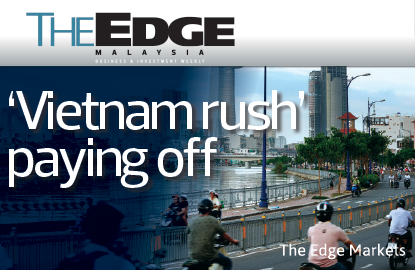

KUALA LUMPUR (Oct 24): In 2008, Vietnam was among the first emerging markets in Asia to fall when the US subprime mortgage-induced global financial crisis broke out.
Plummeting dong, hyperinflation and mounting non-performing loans (NPLs) then dragged the Asean member country into a debt trap, with NPLs peaking at 8.6%.
Overnight, it was as if the country's great economic potential, with its large young population and low labour costs, was wiped out.

As things turned ugly with workers demanding more money to mitigate the rapidly depreciating dong, some Malaysian companies cashed out, while others scaled down their operations in the face of flagging domestic demand.
In the latest The Edge Malaysia's cover story 'Vietnam Rush Paying Off' (Oct 26-Nov 1), writer Kamarul Azhar recounted, among others, how IGB Corp Bhd sold off its interest in New World Saigon Hotel in 2011, and Berjaya Land Bhd reduced the size of its Vietnam International Financial Centre project in Ho Chi Minh City and withdrew from the US$2 billion Nhon Trach New Development City in 2013.
Today, Tan Chong Motor Group, Ireka Corp Bhd, Poh Huat Resources Holdings and Berjaya Land are among the Malaysian companies still with major investments in Vietnam -- and the weekly noted that their perseverance appears to be paying off, as Vietnam's economy has quietly rebounded recently.
In 2014, it grew 6% year on year, with economists attributing the strong growth to exports. In 2013, it grew 5.4%.
Vietnam recorded the highest amount of foreign direct investment among the Asean-5 in the last 24 months, the weekly reported.
Its GDP also grew at a faster clip of 6.3% in the first half of this year, compared with 5.2% previously.
While the ringgit and Indonesian rupiah have tumbled 16.6% and 8.14% respectively in value against the US dollar, the dong has only slid 4.32%, and has even climbed 15% against the ringgit.
The weekly went on to detail some of the plans of those Malaysian companies who stayed behind in Vietnam.
What more, the country, a party to the recently concluded Trans-Pacific Partnership Agreement, is expected to be among the biggest beneficiaries in this part of the world if the pact is ratified.
In comparison, export growth in Malaysia has been far from exciting in recent years, with its domestic economy having had to rely on consumer spending and private investment.
So, for those who have turned their backs on Vietnam previously, is it a time to reconsider now?
Pick up a copy of The Edge today from news stands around you to find out more.
P/S: It can also be downloaded from Apple’s Newsstand and Androids’ Google Play.